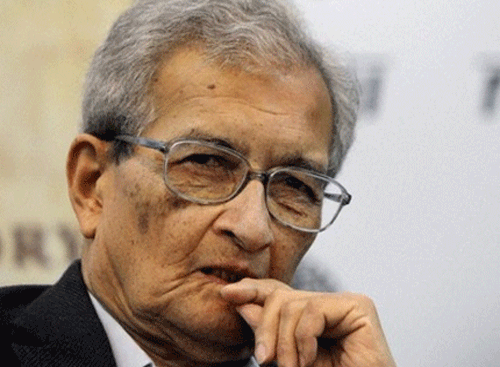
Nobel laureate Amartya Sen on Wednesday said that India needs tolerance "very badly" but also underscored the importance of skeptical tolerance.
An aluumni of erstwhile Presidency College which has now developed into the Presidency University, Sen discussed the influence and contributions of early 19th century poet Henry Louis Vivian Derozio in education and society.
"The general idea was to accept any kind of belief that comes from any side. Tolerance is a very great virtue, and right now in India we need it very badly.
"In addition, there is a need for skeptical tolerance which was one of the things Derozio had. He didn't have enmity for any group but questions for every group," he added.
Sen was conferred the D.Litt. (honoris causa) by the Presidency University here.
Presidency University has its roots in the Hindu College, established in 1817. It was named Presidency College in 1855. Derozio was assistant headmaster of Hindu College.
Calling Derozio's legacy as an inheritance, Sen urged current batch of Presidency students to address the major issues confronting India. But he cautioned against too much interference by the government.
"When we live in a society where there are major issues to be addressed, we have to address that not as a government college but remember our origin is a civil society. Presidency would certainly want government's help but (it should) not (be) dominant.
"We have to cultivate the highest quality of education, elitism in that sense. Detachment would not work," he said.
Calling for scepticism and reasoning in the activities, be it history or science, Sen - the author of "The Argumentative Indian" - stressed on being relevant to society.
"Presidency has to ask constantly are we relevant in India or in the world. What we can we do? We live in very difficult times with violence, with battle against hunger, undernourishment, illiteracy and lack of education and bad education at the school level being the dominating feature of the country," he added.
He also said that democracy was not just majoritarian rule.
"In India, when we say democracy may be under some threat, what are the issues?
"First of all, democracy is not just a majoritarian rule, it also involves minority rights, it involves liberty and liberty of expressions and so on."
"Secondly, what is now called majority is not in fact majority... It's mostly plurality... You might get 30 or 39 percent and then you sweep the parliament because the Indian constitution makers were aware of that, they discussed that in the constituent assembly.
"They didn't talk so much that minority could become a majority in parliament but they discussed the upper house having a status of its own," he added.